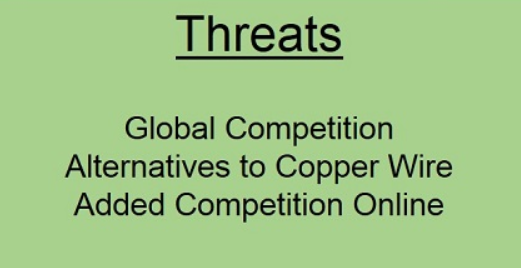 |
Chris Bell | 'The man on top of the mountain didn't fall there.' |
| - Vince Lombardi |
 |
Chris Bell | 'The man on top of the mountain didn't fall there.' |
| - Vince Lombardi |
SNHU - MBA-665 Government Impact on Business
Written by: Chris Bell - June, 2018
WesBell Electronics was founded by my father, Ken Bell, in 1988 and he still owns and operates the day-to-day operations at 67 years old with 30 employees. WesBell started as a wire and cable distributor of copper-based products and expanded into contract manufacturing as customers began requesting services such as cutting wire, stripping insulation, crimping terminals, soldering and small wire harnesses. WesBell secures less than 1% of the market share of copper wire products sold throughout the world. Their biggest distribution competitor is Anixter (NYSE: AXE) which is currently a 2.37-Billion-dollar company with $8 Billion in revenue compared to WesBell’s $10 million in revenue. Anixter has mainly fueled grow over the years through mergers and acquisitions.

One of WesBell’s biggest opportunities is to grow their services business by contacting each of their current distribution customers to see if they want WesBell to cut and strip the wire that they already sell to them. For example, most customers that purchase 1,000 feet of copper wire, cut it into pieces and connect it from A-to-B. WesBell has invested in equipment that cuts 10,000 pieces of wire per day, per machine, depending on the length and customer tolerance. Another opportunity for WesBell, since they’re profitable and cash flow is positive, would be to acquire another distributor on the west coast.
Threats facing WesBell include the age of the founder/CEO and the soon change of ownership and leadership. Perhaps he will sell it to Anixter or hand it down to his two sons. The threat is strong because there isn’t a solid exit plan in place nor a plan of action for the changes to come. Ken also has a long term strong relationship with the biggest customer, currently 30% of sales and profits, which is scary in an industry where relationships play an important role.

A potential governmental action facing WesBell would be the transition of operating as a small business with 30 employees to operating as a corporation with 50 employees. Distribution didn’t require much labor-intensive work, but offering services requires WesBell to hire numerous laborers to manufacture wire and cable assemblies. For example, WesBell grew from $8 million to $10 million in revenue but jumped from 20 to 30 employees. While profitable, WesBell foresees the challenge of transitioning into a large corporation and adhering to new governmental rules and regulations. According to the Department of Labor (www.dol.gov), when WesBell reaches an average annual amount of 50 employees they need to adhere to certain levels of health care for employees under the Affordable Care Act, adhere to the rules of FMLA, adhere to new parental leaves of absence, and according to the IRS (www.irs.gov) WesBell will need to operate as a corporate company, pay taxes differently and submit more information in their tax return.
Separately, over the past 10-15 years WesBell has been forced to follow new regulations such as WEEE (Waste Electrical & Electronic Equipment), RoHS (Restriction of Hazardous Substances) compliance and REACH (Registration, Evaluation, Authorization and Restriction of Chemicals) compliance, along with more conflict mineral rules and regulations. According to the Securities and Exchange Commission (www.SEC.gov) “In 2010, Congress passed the Dodd-Frank Act, which directs the Commission to issue rules requiring certain companies to disclose their use of conflict minerals if those minerals are “necessary to the functionality or production of a product” manufactured by those companies. Under the Act, those minerals include tantalum, tin, gold or tungsten.” These types are new regulations trickle through the copper wire industry, especially with contract manufacturers that use various types of metal when crimping terminals to the wires. WesBell needs to prove that they purchase wire and cable products from manufacturers that don’t use conflict minerals or buy from countries with conflict minerals.

In conclusion, WesBell needs to be proactive in finding and adhering to new governmental actions, policies, rules and regulations pertaining to companies with more than 50 employees, conflict minerals pertaining to their product line that includes copper, tin, lead solder, silver, nickel and some gold and brass plated terminals. Acting ignorant to avoid arduous and expensive tasks in business isn’t the right approach for numerous reasons.
References:European Commission (n.d.). Waste Electrical & Electronic Equipment (WEEE). Retrieved from:http://ec.europa.eu/environment/waste/weee/index_en.htm RoHS Guide (n.d.). RoHS Compliance FAQ. Retrieved from: http://www.rohsguide.com/rohs-faq.htm SEC.gov. (n.d.). U.S. Securities and Exchange Commission. Disclosing the use of conflict minerals. Retrieved from: https://www.sec.gov/opa/Article/2012-2012-163htm---related-materials.html |